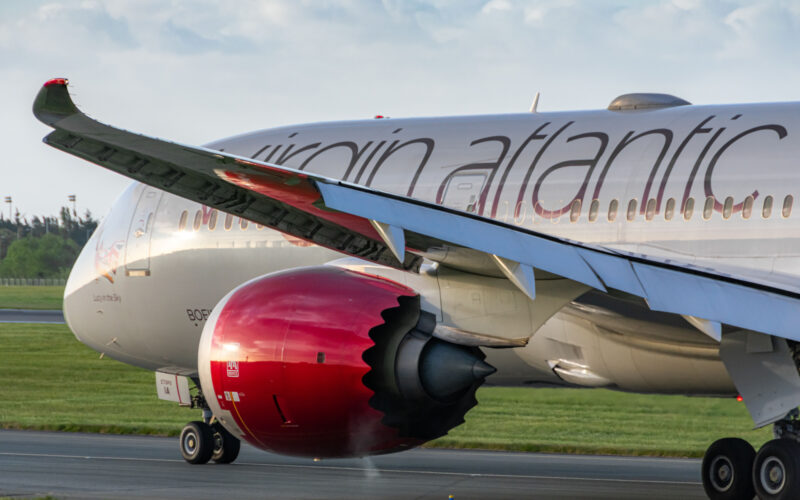The UK’s Civil Aviation Authority (CAA) has issued Virgin Atlantic with a permit to fly the world’s first transatlantic using 100% Sustainable Aviation Fuel (SAF).
Virgin Atlantic plans to fly across the Atlantic from London-Heathrow (LHR) to New York-JFK Airport on November 28, 2023, to showcase the feasibility of flying on 100% SAF in the future. The flight will use the unique flight number of VS100.
As international standards do not yet permit more than a 50% blend of synthetic fuel with regular jet fuel, Virgin Atlantic’s proposed flight required a specific permit to fly from the CAA.
The permit has been issued following a program of technical reviews by the regulator, which analyzed different aspects of the planned flight, including undertaking ground testing with Rolls-Royce on a Trent 1000 engine running on 100% SAF.
A Transatlantic ‘first’
Led by Virgin Atlantic and partly funded by the UK Government’s Department for Transport, preparation for the flight has involved a consortium of companies, including Boeing, Rolls-Royce, BP, and others, to demonstrate SAF as an alternative to regular jet fuel.
On announcing the details of the proposed flight, Rob Bishton, Chief Executive at the UK Civil Aviation Authority, said: “As the UK’s aviation regulator, it’s important that we safely enable the industry to embrace more sustainable practices and push the boundaries of what’s possible to create a greener aviation industry. This permit not only allows Virgin Atlantic and others to showcase their commitment to sustainability but also serves as an example of how the industry is always exploring new technologies.”
Bishton continued: “Innovation and sustainability are vital areas of work, but they must go hand in hand with safety. This is a reminder that together we can drive change, reduce emissions, and make the skies greener for generations to come.”
Highlighting the importance of the initiative being taken by Virgin Atlantic, UK Transport Secretary Mark Harper said, “The world’s journey to decarbonising flight starts here in the UK, with today’s announcement helped by Government funding so people can continue to travel how they want, in a way that’s fit for the future. By turning waste materials into the fuel of the future that will power our aviation sector, it’s UK innovation that is leading the way with the world’s first transatlantic 100% SAF powered flight.”
Meanwhile, Shai Weiss, CEO of Virgin Atlantic, said: “The Civil Aviation Authority’s permit to fly Flight 100 marks a key milestone and a huge achievement for all the teams working towards this historic flight. Getting to this point has been more than a year in the making and has taken radical collaboration across our consortium partners and government. We’re committed to using 10% SAF by 2030, but to get there, we need the government to support the creation of a UK SAF industry. We know that if we can make it, we can fly it.”
Collaborative working
The UK CAA worked closely with the consortium throughout their application and has vowed to continue to work alongside the industry to learn more about the performance and impact of SAF.
Following a challenge launched by the Department for Transport last year to support the aviation industry in achieving the first transatlantic flight on an aircraft powered by 100% SAF, Virgin Atlantic was awarded up to £1 million in UK government funding in December 2022 to achieve the goal.
The permit forms the first of several approvals required for the flight, but its issue paves the way for Virgin Atlantic to submit applications to The US Federal Aviation Administration (FAA), Irish Aviation Authority, and Transport Canada to allow the flight to travel through US, Irish and Canadian airspace respectively.
SAF is fuel derived from non-petroleum-based renewable sources that are capable of being used as a replacement for or blended with kerosene. SAF can currently be used in jet engines to a maximum blend of 50% with traditional kerosene without the need for any modifications.
There are a number of processes to produce SAF, including algae, synthesized fuels from hydrogen waste, or from directly capturing carbon dioxide. When fully replacing kerosene, SAF could reportedly reduce lifecycle carbon emissions by over 70% compared to conventional fossil jet fuel.

